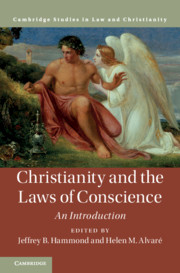Book contents
- Christianity and the Laws of Conscience
- Law and Christianity
- Christianity and the Laws of Conscience
- Copyright page
- Dedication
- Contents
- Contributors
- Acknowledgments
- Introduction
- Part I Themes in Understandings of Conscience in Christianity
- Part II Conscience According to Major Figures and Traditions
- 5 Conscience in the Early Church Fathers
- 6 St. Thomas Aquinas on Conscience
- 7 Reforming the Conscience
- 8 Toward a Theology of a Redeemed Conscience
- 9 Pierre Bayle
- 10 Freedom of Conscience and Its Right to Constitutional Protection
- 11 Jonathan Edwards on Conscience
- 12 Obeying God Rather Than Men
- 13 Mormonism and Conscience
- 14 Culture and Conscience in the Thought of Joseph Ratzinger, Pope Benedict XVI
- Part III Applied Topics in Law and Conscience
- Index
- References
12 - Obeying God Rather Than Men
Uneasy Evangelicals, Conscience, and Politics
from Part II - Conscience According to Major Figures and Traditions
Published online by Cambridge University Press: 12 June 2021
- Christianity and the Laws of Conscience
- Law and Christianity
- Christianity and the Laws of Conscience
- Copyright page
- Dedication
- Contents
- Contributors
- Acknowledgments
- Introduction
- Part I Themes in Understandings of Conscience in Christianity
- Part II Conscience According to Major Figures and Traditions
- 5 Conscience in the Early Church Fathers
- 6 St. Thomas Aquinas on Conscience
- 7 Reforming the Conscience
- 8 Toward a Theology of a Redeemed Conscience
- 9 Pierre Bayle
- 10 Freedom of Conscience and Its Right to Constitutional Protection
- 11 Jonathan Edwards on Conscience
- 12 Obeying God Rather Than Men
- 13 Mormonism and Conscience
- 14 Culture and Conscience in the Thought of Joseph Ratzinger, Pope Benedict XVI
- Part III Applied Topics in Law and Conscience
- Index
- References
Summary
Micah Watson argues that an active conscience is the outgrowth of the evangelical mind. Evangelicalism is the form of Protestantism that relies on the truths of historical Christianity while navigating between mainline Protestantism and fundamentalism. For evangelicals, conscience is founded in the Bible, particularly the writings of Paul. It also flowered in the post-Reformation world, where it was taught that an active conscience signaled a person’s salvation. Conscience also led evangelicals to be active against all forms of sinfulness. In the United States, this contributed to the proliferation of voluntary societies, where Christians who were “saved for service” could exercise their consciences to spread the Gospel or stamp out perceived evils (like alcohol use). Watson traces the history of evangelical conscience into the twentieth century, and he describes voices like Carl Henry and others who sought harmony between the pious strand of evangelicalism, and adherents who were committed to social action. Later in the twentieth century, evangelicals sought peace in society more than saving it. Still, evangelicals continue to oppose perceived social evils, including same-sex marriage.
Keywords
- Type
- Chapter
- Information
- Christianity and the Laws of ConscienceAn Introduction, pp. 227 - 244Publisher: Cambridge University PressPrint publication year: 2021

